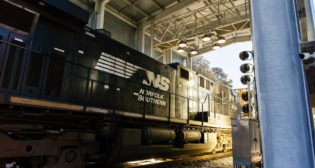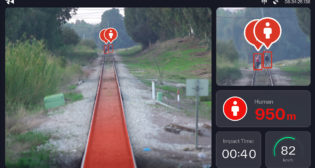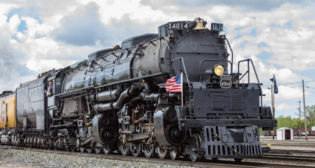
COVID-19 and the Rail Economy
Written by David Nahass, Financial Editor
FINANCIAL EDGE, RAILWAY AGE MAY 2020 ISSUE: Too much ink (printer ink in the modern era) has already been spilt trying to find an angle on the COVID-19 pandemic and its impact on the national and global economy, the consumer, the business segments most impacted by the terrible crisis (think aerospace, restaurants, the arts), the front line healthcare workers risking their lives daily and the retail, delivery and factory workers keeping aspects of life in the United States (e.g. food supply) relatively normal.
North American freight rail rides slightly above the fray. While national passenger services (Amtrak and local transit) have cut back due to quarantining and ridership drop-offs, freight must continue to move.
There is no more essential service than delivering grain to mills and milled products to facilities for processing into consumable foodstuff.
There is nothing more necessary than a boxcar filled with two- (or three-) ply toilet paper making its way to a distribution center to satisfy the needs of a crazy domestic population of hoarders.
The rail industry will have to deal with pandemic-related challenges: Decreases in loadings will hurt railroads; decreases in industrial production and supply chain disruptions will hurt shippers; decreases in railcar and locomotive demand and lease rates will hurt manufacturers and equipment lessors.
As Eric Marchetto, Chief Financial Officer of Trinity Industries, noted in a Cowen and Company teleconference, motor vehicles and parts represent about 2% of railcar loadings annually; petroleum and petroleum products about 12%. As auto manufacturers deal with the fallout resulting from job losses, unemployment and social distancing, auto sales will drop drastically. Rail loadings in that segment will drop in kind. Right now, those loadings will not be replaced. Those lost loadings will be added to other reductions resulting from historic decreases in the price of oil and in the consumption of refined fuels and the impact on domestic frac drilling.
Be assured, North American rail has numerous challenges ahead.
So here is your reality check. Rail will survive and return to pre-pandemic levels. Railcar lessors, OEMs and Class I railroads have survived earlier crises since the repeal of the Staggers Act. They will survive this current crisis.
There will be a time to discuss the impacts of the pandemic on the railcar manufacturing and lease market (beginning in Railway Age’s Guide to Equipment Leasing, June 2020 issue), but right now we must focus on managing the difficult crises affecting us in the moment while preparing to meet the multitude of challenges in the future.
In a Railway Age podcast with Eric Starks and Todd Tranausky of FTR Transportation Intelligence, it was mentioned that railcar deliveries in 2020 are expected to decline to the low 20,000s, but could drop into the high teens if the economy does not return to a reasonable level of activity by early mid-year. This is down from earlier estimates of 35,000. Industry veterans have seen railcar builds of roughly 17,000 cars in 2010 and 2002. 2010 was the result of the Great Recession and 2002 was the overbuild following the three Class I megamergers of 1996-1998 (Union Pacific/Southern Pacific; Burlington Northern/ATSF and Norfolk Southern and CSX splitting Conrail).
Rail recovered from those years and will recover from this crisis as the pandemic recedes and life, consumption, retail sales and industrial activity return to normal. It will rise again to reclaim what has been lost. Stay positive for the future and let those expectations of a return to normalcy carry you through the challenges of the present.

I want to close this month’s column by adding a note of remembrance for Daniel “Dan” Wallace, who passed away on April 19, 2020 at the way-too-young age of 50 from complications associated with severe metastatic melanoma.
Dan spent the majority of his career in rail finance, beginning at the incubator that was GE Railcar Services (now Wells Fargo Rail). Dan also worked at Redwood Rail LLC (a boutique operating lessor), City National Bank and FreightCar America. He fought his cancer many years with class and grace. He was able to lead a mostly healthy and lengthy period of his life, during which he married a woman he loved and started a family until cancer came back after him.
Dan was a man of positive disposition and warmth and was well-regarded throughout the industry. He will be missed for his smile and good nature and his unwavering commitment to be the best person he could be with the time he had.
Dan Wallace’s presence will be missed by friends and colleagues through the industry. His passing during this time reminds us how important the people in our lives are, especially in times of crisis. My condolences to all those who have lost loved ones to the coronavirus.



